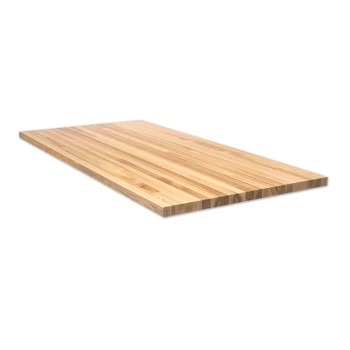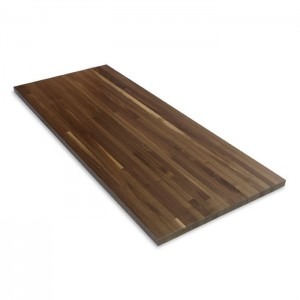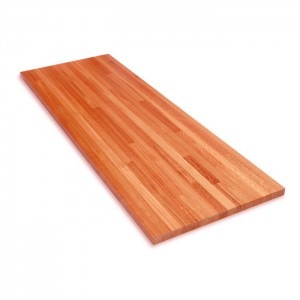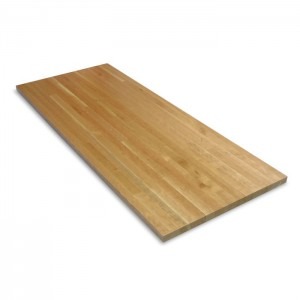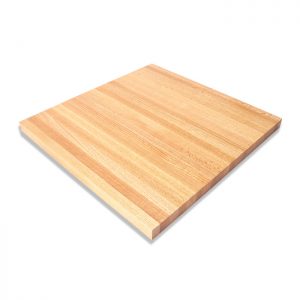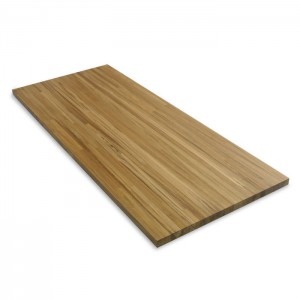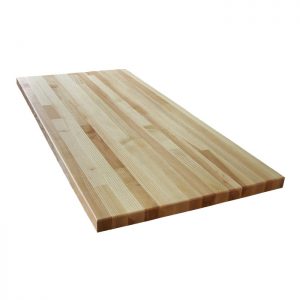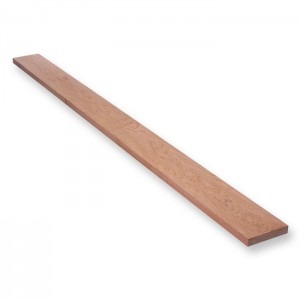Butcher Block Countertops
What are Butcher Block Countertops?
Butcher block countertops are kitchen surfaces made from straight cuts of wood glued together into thick slabs. They provide a warm, natural look and are favored for their functionality and aesthetic appeal. These countertops are known for their durability and ease of repair. Typically used in both traditional and modern kitchen designs, they offer a unique blend of practicality and style. Butcher blocks are particularly appreciated by those who do a lot of chopping and cutting, as they are kind to knives and can be sanded and resealed to remove any marks or scratches.
What are Butcher Block Countertops Made of?
Butcher block countertops are typically made from pieces of wood that are cut, glued, and laminated together to create a solid, durable surface. Various types of wood can be used, including maple, oak, cherry, and walnut, each offering different colors and grain patterns. The wood is often arranged in either an edge grain, where long strips of wood are laid side-by-side, or an end grain, which displays the wood’s fibers and is more resistant to cuts and scratches. These countertops are favored for their natural warmth, durability, and ability to be sanded and refinished as needed.
End Grain, Edge Grain, and Face Grain for Butcher Block Countertops
End Grain, Edge Grain, and Face Grain refer to the different ways wood is cut and assembled to create butcher block countertops, each serving a specific purpose and aesthetic.
- End-Grain:End Grain involves cutting the wood into blocks and aligning them with the end of the wood (the cut side) facing up. This creates a durable, knife-friendly surface ideal for heavy chopping and presents a unique checkerboard pattern. The End-Grain, renowned for its checkerboard pattern, is the strongest and most suitable for heavy-duty use, such as chopping and slicing.
- Edge-Grain: Edge Grain is made by placing long boards side-by-side, with the edge of the wood facing up. It offers a balanced blend of durability and affordability, displaying a clean, linear look. Edge Grain offers a more uniform and smooth appearance, making it a popular choice for general kitchen use and providing a balance of durability and aesthetics.
- Face-Grain Plank Style: Face Grain uses wood planks laid flat, showcasing the wood’s natural grain. It’s visually appealing but less durable than the other types, being more susceptible to scratches. Face Grain showcases the beauty of wood grain most prominently and is ideal for light-use areas, offering an attractive option for those prioritizing aesthetics.
Each grain type serves a specific purpose, allowing homeowners to choose based on their usage requirements and design preferences.
What is the best grain for a butcher block?
The “best” grain for a butcher block depends on your specific needs and usage. End Grain is widely considered the best for heavy-duty cutting and chopping because it’s durable and gentle on knives. However, it’s also the most expensive. Edge Grain is a popular choice for its balance of durability, affordability, and ease of maintenance, making it ideal for general kitchen use. Face Grain is more about aesthetic appeal and is best for light-use areas where the beauty of the wood is the main focus. Your choice should be based on your cooking habits, maintenance preferences, and budget.
How Popular are Butcher Block Countertops?
Butcher block countertops are popular for their natural warmth and aesthetic appeal, offering a classic, cozy feel to kitchens. They’re appreciated for their durability and the ease with which they can be sanded and refinished, effectively removing any scratches or marks. Their functionality, especially for culinary enthusiasts who value a solid, knife-friendly surface for food preparation, adds to their appeal. Additionally, butcher blocks provide an eco-friendly option, often made from sustainably sourced wood, making them a choice that aligns with environmentally conscious preferences.
Why Use Butcher Block Countertops?
Using butcher block countertops is a great choice due to their practical and aesthetic benefits. They provide a warm, inviting look to any kitchen, enhancing the room’s overall ambiance. Butcher blocks are also renowned for their durability and functionality, especially for those who frequently cook and prep food, as they offer a sturdy, knife-friendly surface. The ability to sand and refinish them extends their lifespan and keeps them looking new. Additionally, they are an eco-friendly option, often made from sustainably sourced wood.
What are The Pros of Butcher Block Countertops?
It’s essential to weigh their pros and cons when considering butcher block countertops for your kitchen: Butcher blocks offer a unique combination of aesthetic warmth and practical functionality, making them a favored choice for many homeowners. However, like all materials, they come with their own set of drawbacks that need to be considered. Understanding these advantages and disadvantages will help in making an informed decision about whether butcher block countertops are the right fit for your kitchen’s needs and style.
What are The Cons of Butcher Block Countertops?
Advantages of Butcher Block Countertops:
- Aesthetic Appeal: Butcher block countertops bring a warm, inviting ambiance to kitchens. The natural wood grain enhances both rustic and modern designs, offering a touch of organic beauty.
- Durability: When maintained well, butcher blocks can withstand years of use. The solid wood construction resists wear and tear, making them a long-lasting countertop option.
- Knife-Friendly: The softer surface of wood is kinder to knives, helping to keep blades sharper for longer compared to harder countertop materials.
- Repairable: Minor damages like scratches and nicks can be easily sanded down, allowing the countertop to be restored to its original condition.
- Eco-Friendly: Many butcher blocks are made from sustainably sourced or reclaimed wood, aligning with eco-conscious choices and reducing environmental impact.
- Versatility: They come in various types of wood, stains, and finishes, making it easy to find an option that fits any kitchen’s style and color scheme.
- Cost-Effective: Generally, butcher block countertops are more budget-friendly than many stone or engineered materials, offering an affordable yet attractive solution.
What are The Cons of Butcher Block Countertops?
The disadvantages of Butcher Block countertops include:
- Susceptibility to Water Damage: If not properly sealed, wood can absorb water, leading to warping or rotting.
- Maintenance Requirements: Regular oiling and sealing are necessary to maintain their appearance and prevent damage.
- Not Heat Resistant: Unlike stone countertops, butcher blocks can be damaged by hot pots and pans.
- Bacteria Growth: If not properly cleaned, wood can harbor bacteria, making regular cleaning essential.
- Vulnerability to Stains and Scratches: Wood can be susceptible to stains and scratches, which may require more frequent maintenance.
How Much do Butcher Block Butcher Block Cost?
The cost of a butcher block countertop will vary depending on the size, material, and finish. However, you can expect to pay between $30 and $200 per square foot for a butcher block countertop. You can find the some costs of butcher block countertops according to their size and wood type:
Size | Wood | Average Cost per Square Foot |
24 inches by 36 inches | Maple | $60 to $80 |
24 inches by 48 inches | Maple | $70 to $90 |
36 inches by 36 inches | Maple | $80 to $100 |
36 inches by 48 inches | Maple | $90 to $110 |
48 inches by 48 inches | Maple | $100 to $120 |
24 inches by 36 inches | Birch | $40 to $60 |
24 inches by 48 inches | Birch | $50 to $70 |
36 inches by 36 inches | Birch | $60 to $80 |
36 inches by 48 inches | Birch | $70 to $90 |
48 inches by 48 inches | Birch | $80 to $100 |
24 inches by 36 inches | Walnut | $80 to $100 |
24 inches by 48 inches | Walnut | $90 to $110 |
36 inches by 36 inches | Walnut | $100 to $120 |
36 inches by 48 inches | Walnut | $110 to $130 |
48 inches by 48 inches | Walnut | $120 to $140 |
What are The Factors that Affect The Cost of Butcher Block Countertops?
The factors that affect the cost of butcher block countertops:
- Wood species
- Thickness of the block
- Whether the countertop is custom-made
Lower-cost options might use more common woods, while higher-end choices may feature exotic woods or custom designs. For a precise quote, it’s recommended to consult with a local supplier or contractor.
What are The Best Brands for Butcher Block Countertops?
- John Boos & Co.: John Boos & Co. is a family-owned company that has been making butcher block countertops since 1887. They are known for their high-quality materials, craftsmanship, and durable finishes. John Boos butcher block countertops are made from a variety of hardwoods, including maple, cherry, and walnut. They are also available in a variety of sizes and styles to suit any kitchen.
- Carrara Butcher Block Co.: Carrara Butcher Block Co. is a newer company that has quickly become a favorite among home cooks and designers. They are known for their unique and innovative designs, as well as their commitment to sustainability. Carrara Butcher Block Co. butcher block countertops are made from a variety of ethically sourced hardwoods, and they are finished with natural oil that is safe for food preparation.
- Edge Grain Butcher Block Co.: Edge Grain Butcher Block Co. is another newer company that is making a name for itself in the butcher block countertop industry. They are known for their high-quality materials, affordable prices, and wide selection of options. Edge Grain Butcher Block Co. butcher block countertops are made from a variety of hardwoods, including maple, birch, and walnut. They are also available in a variety of sizes and styles to suit any kitchen.
- I.G. Butcher Block: B.I.G. Butcher Block is a company that specializes in custom butcher block countertops. They are known for their ability to create countertops that are perfect for any kitchen, no matter the size or style. B.I.G. Butcher Block countertops are made from a variety of hardwoods, including maple, cherry, and walnut. They are also available in a variety of finishes, including natural oil, polyurethane, and wax.
- Lumber Liquidators: Lumber Liquidators is a large, national retailer that offers a wide variety of flooring and home improvement products, including butcher block countertops. They are known for their affordable prices and their selection of pre-finished butcher block countertops.
- IKEA: IKEA is a Swedish multinational furniture retailer that operates a chain of large-format furniture stores. They offer a variety of butcher block countertops, including both pre-finished and unfinished options. IKEA’s butcher block countertops are popular among DIY enthusiasts and homeowners on a budget.
- Floor & Décor: Floor & Decor is a home improvement retailer that specializes in flooring and countertops. They offer a wide variety of butcher block countertops, including a variety of wood types and sizes. Floor & Decor’s butcher block countertops are known for their quality and durability.
When choosing a butcher block countertop, it is important to consider your budget, the size and style of your kitchen, and your personal preferences. You will also want to make sure that you choose a brand that has a good reputation for quality and customer service.
What are The Popular Butcher Block Countertop Styles?
Popular butcher block countertop styles focus on highlighting the natural beauty of the stone and include:
- Traditional Style: Often made with maple, a hard and durable wood, this style presents a classic and warm appearance, fitting seamlessly into kitchens with a more traditional or homely aesthetic.
- Rustic Style: Utilizes reclaimed, aged, or distressed wood, adding character and a sense of history. Perfect for farmhouse or country-style kitchens, these countertops often have more visible grain and a rugged appearance.
- Modern Style: Incorporates woods like bamboo or walnut, known for their distinctive colors and grains. These countertops suit contemporary spaces with their clean lines and minimalist design.
- Custom-Designed Style: Tailored specifically to individual preferences, these countertops can include a mix of wood species, customized edge treatments, and unique finishes, allowing for complete personalization to match any kitchen design.
What are Butcher Block Wood Types?
Common wood types used for butcher block countertops include:
- Maple: A popular choice due to its hardness and durability, offering a classic look.
- Oak: Known for its strength and attractive grain pattern, suitable for a rustic aesthetic.
- Walnut: Offers rich, dark tones, ideal for a more elegant, sophisticated appearance.
- Cherry: Has a warm, reddish hue that deepens over time, adding a unique charm.
- Bamboo: Eco-friendly and modern, with a distinctive grain and light color.
- Birch: A more affordable option with a light color and subtle grain.
What Type of Wood is The Best for Butcher Block Countertops?
The “best” butcher block wood type often depends on individual needs and preferences. Maple is widely regarded for its durability and neutral color, making it a popular choice for heavy-use areas. Walnut is favored for its rich, dark color and luxurious appearance. Cherry, with its warm, reddish tones, offers a unique look that deepens with time. Each wood type has its strengths, whether in hardness, color, or grain pattern, so the best choice varies based on factors like intended use, aesthetic preference, and budget.
What are The Popular Butcher Block Countertop Colors?
Popular colors for butcher block countertops largely depend on the wood type used, each offering its unique hue:
- Natural Maple: Natural Maple is a light, creamy color that can brighten up any kitchen space. It is a popular choice for kitchens that want a modern or minimalist look. Maple is also a durable and easy-to-care-for wood, making it a good choice for busy kitchens.
- Rich Walnut: Rich Walnut is a deep, dark brown color that provides a sense of elegance and warmth. It is a popular choice for kitchens that want a traditional or formal look. Walnut is also a durable wood, but it can be more susceptible to scratches and stains than maple.
- Warm Cherry: Warm Cherry is a reddish-brown color that is known for its charming patina. It is a popular choice for kitchens that want a rustic or farmhouse feel. Cherry is a durable wood that can withstand heavy use, but it can also be more expensive than other woods.
- Golden Oak: Golden Oak is a classic golden hue that offers a warm and inviting atmosphere. It is a popular choice for kitchens that want a traditional or timeless look. Oak is a durable wood, but it can be more difficult to maintain than other woods.
- Pale Birch: Pale Birch is a lighter option that has a subtle grain and a soft, neutral color. It is a popular choice for kitchens that want a modern or Scandinavian look. Birch is a durable wood, but it can be more prone to chipping and cracking than other woods.
- Bamboo: Bamboo is typically a light, natural color that contributes to a modern, eco-friendly kitchen design. It is a sustainable wood that is also very durable. However, bamboo can be more expensive than other woods and may not be as heat-resistant.
- White: White butcher block countertops are a popular choice for kitchens that want a modern or minimalist look. White countertops can brighten up a space and make it feel more spacious.
- Black: Black butcher block countertops are a bold and dramatic choice for kitchens that want a statement piece. Black countertops can add sophistication and elegance to a space.
- Gray: Gray butcher block countertops are a versatile option that can work in a variety of kitchens, from traditional to modern. Gray countertops can add depth and dimension to a space.
- Burnt orange: Burnt orange butcher block countertops are a warm and inviting choice for kitchens that want a rustic or farmhouse feel. Burnt orange countertops can add a touch of color and personality to a space.
These colors vary from light and neutral to dark and rich, allowing for versatility in matching different kitchen styles and designs.
Are Butcher Block Countertops Environmentally Friendly?
Butcher block countertops are considered environmentally friendly, particularly when made from sustainably sourced or reclaimed wood. The use of natural materials and the ability to refinish rather than replace them contribute to their eco-friendliness. Additionally, wood is a renewable resource, and some butcher block countertops are made from fast-growing, less resource-intensive species like bamboo.
How are Butcher Block Countertops Installed?
Installing butcher block countertops involves a series of steps. First, accurate measurements of the kitchen space are taken to ensure the countertops will fit properly. The butcher block is then cut to these measurements, with consideration for sink or appliance placements. The surface beneath the countertop must be prepared, ensuring it’s level and stable. The butcher block is then placed and securely attached to the cabinetry or the base using adhesives or screws. Finally, the countertop is sealed to protect the wood from moisture and stains. Due to the specifics of working with wood, professional installation is often recommended.
Do Butcher Block Countertops Require Maintenance?
Yes, butcher block countertops require regular maintenance to keep them in good condition. It’s important to protect them from excessive moisture and heat. With consistent care, butcher block countertops can remain functional and aesthetically pleasing for many years.
How to Maintain Butcher Block Countertops
Caring butcher block countertops involves regular cleaning, oiling, and occasional sanding. For daily cleaning, use a mild soap and warm water, avoiding harsh chemicals. To prevent drying and cracking, apply a food-safe mineral oil or butcher block conditioner regularly. Sanding can be done to remove scratches or stains, followed by oiling to restore the finish. It’s important to keep the wood dry, wiping up spills promptly, and use trivets for hot pots to avoid burns. With proper care, butcher block countertops can maintain their beauty and functionality for years.
How Often Does Butcher Block Countertops Need to Be Sealed?
In general, you should seal butcher block countertops every 6-12 months. The frequency with which you need to seal butcher block countertops will depend on how heavily they are used and how well you maintain them. If you use your countertops frequently or if they are exposed to a lot of moisture, you may need to seal them more often.
Do Butcher Block Countertops Increase Home Value?
Butcher block countertops increase a home’s value by adding a sense of warmth and natural beauty to the kitchen, a key selling point for many homes. Their appeal lies in the trend towards environmentally conscious and sustainable design choices. When integrated into a well-designed kitchen, they can create an inviting, bespoke feel that resonates with potential buyers looking for unique and organic elements in a home. This increase in value is also contingent on the countertops being well-maintained and in line with the overall aesthetic of the home.
Are Butcher Block Countertops a Good Idea?
Butcher block countertops are a good option for those seeking a natural, warm aesthetic in their kitchen. They offer durability, a unique style, and eco-friendliness. However, they require regular maintenance and can be prone to scratches and water damage. Their potential to enhance home value and their versatility in various kitchen designs make them a strong contender in the realm of kitchen countertops.
When considering all types of kitchen countertops, butcher blocks stand out for their organic charm and functionality, suitable for a range of design preferences and practical uses.

